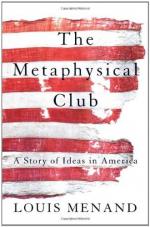
|
| Name: _________________________ | Period: ___________________ |
This quiz consists of 5 multiple choice and 5 short answer questions through Part 5, Chapter 13 Pragmatisms, Section 4 | Part 5, Chapter 13 Pragmatisms, Section 5.
Multiple Choice Questions
1. John Dewey attended the University of Vermont and was a supporter of __________.
(a) Pragmatism.
(b) Burlington philosophy.
(c) Conservative individualism.
(d) Montpelier philosophy.
2. In 1903, James published a book entitled _________.
(a) The Will to Believe.
(b) The Origin of the Species.
(c) The Varieties of Religious Experience.
(d) Studies of Logical Theory.
3. _________ states that the government is created by individuals for the purpose of protecting those individuals.
(a) Pragmatism.
(b) Liberal Individualism.
(c) Transcendent Unity.
(d) Conservative Individualism.
4. _________ was Vermont Transcendentalism, a conservative transcendentalism that focuses on preserving institutions and systems.
(a) Pragmatism.
(b) Montpelier philosophy.
(c) Liberal individualism.
(d) Burlington philosophy.
5. _________ graduated from the University of Vermont in 1858 and took the position of head of the philosophy department in 1867.
(a) Henry Torrey.
(b) John Dewey.
(c) Joseph Torrey.
(d) Sarah Paine Torrey.
Short Answer Questions
1. In 1854 __________ published a two-book set entitled Types of Mankind asserting the supremacy of the white race.
2. _______ used his studies of Black Egyptian skulls to conclude that black people had always been slaves.
3. ___________ believed that mind and reality were abstract and a single process, humans use their ideas to cope in their environment.
4. William James believed that people have beliefs because the object of belief has been shown to have _________.
5. Within his theory of pragmatism, James came to believe that some beliefs were __________.
|
This section contains 233 words (approx. 1 page at 300 words per page) |

|




